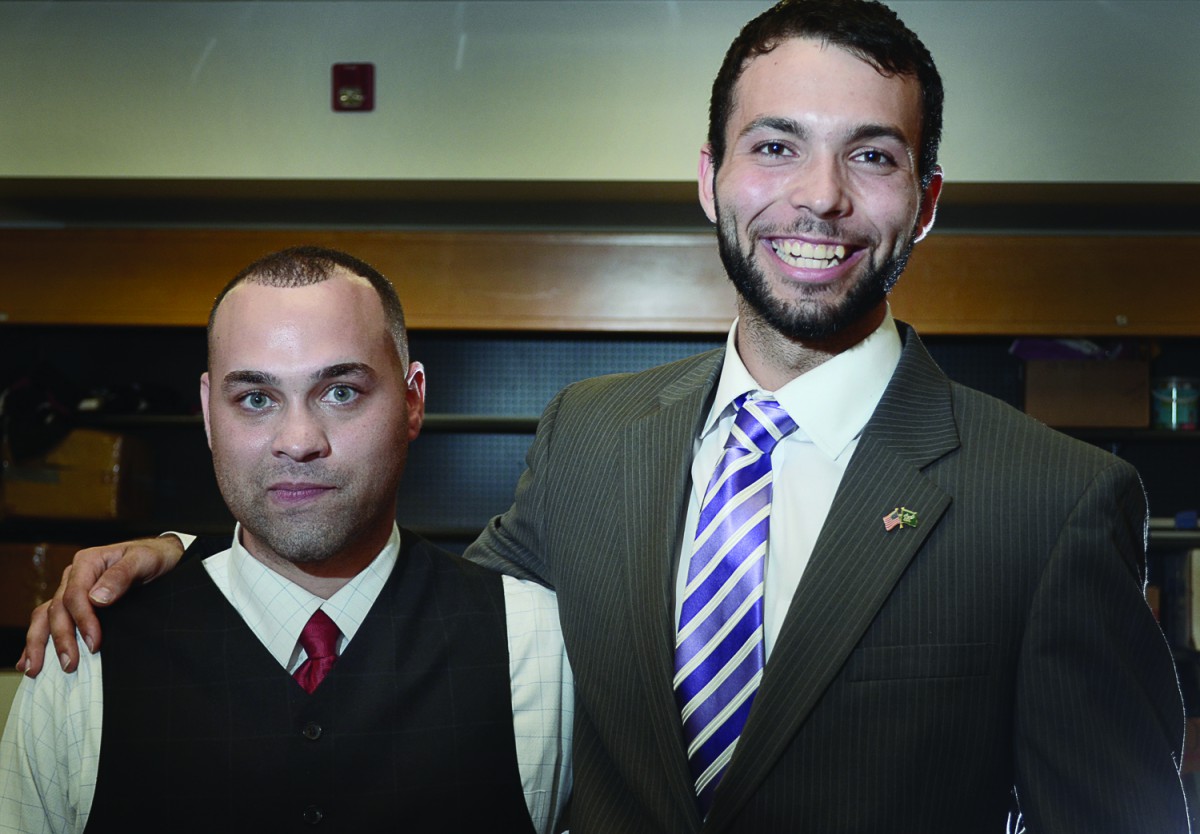Student Government should be at the center of campus culture, creating and fostering “college experiences,” said presidential candidate Mark Lombardi-Nelson.
“One of our main priorities is providing a real college experience by getting more events out there, by supporting our clubs and making sure they’re successful,” Lombardi-Nelson said.
If elected, Lombardi-Nelson said he will expand on the lessons he learned as vice president, where he primarily spent his time helping clubs utilize their funding and making purchases.
Getting the most out of activities and service fees will take some reform, he said. The budgeting process has to be “conducive to clubs, it needs to be easy,” he said, but also fiscally responsible. “There is 80 percent of club budget money still available and there’s three months left. I don’t think the current club budget process is effective.”
While the particulars of changing the budget process will be up to the Senate, Lombardi-Nelson said he would like to see it changed from a budget system, where clubs receive an allotment of cash, to a grant system for individual events and purchases.
To make that work, grants will need to be approved in a committee, not by the entire Senate, he added. “That’s micromanaging, and there’s so many cool things the Senate could be doing.”
The current process also leads to bias, he added, with members fighting for or against certain student organizations. He wants to see SG become more involved with club activities, he said, and less concerned about debating the worth of specific student organizations.
“Clubs are created because they are the vision of students,” said vice presidential candidate Quincy Lopez. “We’re here to help them succeed. If a club wants to request a grant every week, we want to make sure that club’s event is a successful event so that club can thrive and succeed.”
“There are too many times we did not support enough of the clubs and we would go out randomly to check up on them or we would hear that only 10 people attended this event or only 20 people attended this event and nobody had any idea. That’s horrible, that reflects on all of us,” Lopez said.
“We have these students that have these brilliant ideas for these brilliant events and we just say, ‘Go do it’,” without providing support, Lopez said. “That’s going to stop.”
For the cabinet, Lombardi-Nelson and Lopez are looking for “committed professionals” that can work as a team and be held accountable. Rather than broadly defining the role of a position, cabinet members will be given goals and weekly schedules they will be expected to meet.
They also want to create an Office of Club Success which will help student organizations plan and execute events, and keep purchasing cards available and on campus.
Lopez, an Army combat veteran and current SG Veterans Liaison, also wants to start a branch of the Student Veterans Association to provide better access to underutilized services for veterans on campus.
To bring productivity back to SG, Lombardi-Nelson and Lopez will have to lead the way in ending the vitriol that currently exists between the legislative and the executive branches.
Infighting in the government combined with the disruption caused by the Campus Activities Center renovation has hindered the efforts of Student Life, Lombardi-Nelson said. “The relationship between Executive and Legislative has truly hurt,” he said. Fixing that relationship is going to be essential to making the government effective at addressing students’ concerns, he added.
Also at play in this election is the relationship between USFSP and the USF system: for the first time, the St. Petersburg student president will have a shot at a seat on the board of trustees, the governing body of the USF system.
Whether or not he becomes the next student trustee, Lombardi-Nelson said he is a Bull, “100 percent,” and if elected, intends to meet with Tampa’s student leaders to forge a stronger bond and create joint initiatives, making the T-shirt slogan “United as One” more of a reality.
The goals of the Tampa and St. Petersburg student governments haven’t always aligned, however.
For example, plans for members of the USFSP government to attend “Rally in Tally” alongside their Tampa brethren to lobby against tuition hikes were quickly shelved prior to the event in February. Lombardi-Nelson addressed the Senate the week after and passed along a thanks from the administration for understanding the university’s need for funding as it transforms from a commuter school to a more traditional university.
When the Florida Senate proposed a nearly 60 percent loss of state funding in cuts and unfunded mandates to USF Tampa, Lombardi-Nelson posted a call to action on the “USFSP Know It All’s Guide,” a Facebook wall with more than 700 subscribers he co-founded.
The St. Pete and Sarasota branches of the university would have been the least affected universities in the state, with USFSP losing only $600,000 and Sarasota-Manatee gaining $1.7 million. After a conversation with an administrative employee, Lombardi-Nelson removed his post.
The different needs of the Tampa and St. Petersburg campuses have to be recognized, Lombardi-Nelson said, but “We’re family. … We’re together, though we have our own needs and they have their own needs.”
The primary message of the campaign is about “keeping it local,” Lopez said, with a focus on community building both on and off campus.
On campus, this means more services like free printing, movies in the CAC and easier access to money for events, Lombardi-Nelson said. Service projects and a revitalization of the discount program, “Bulls in the ‘Burg,” will get students into the city.
“What kind of organization would we be if we didn’t reach out to the community,” Lopez added, “and let the community reach out to us?”
Photo by Christopher Guinn



